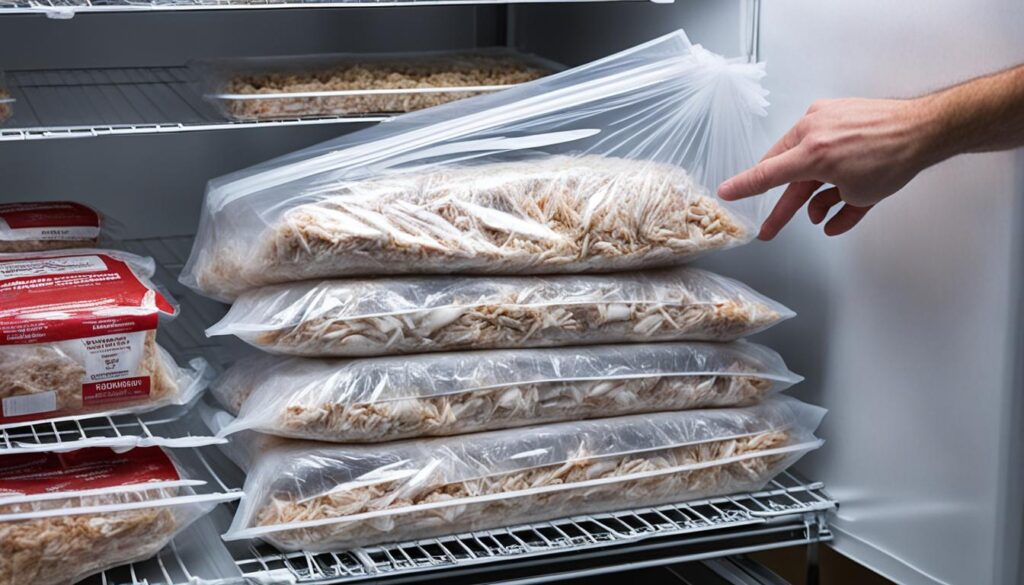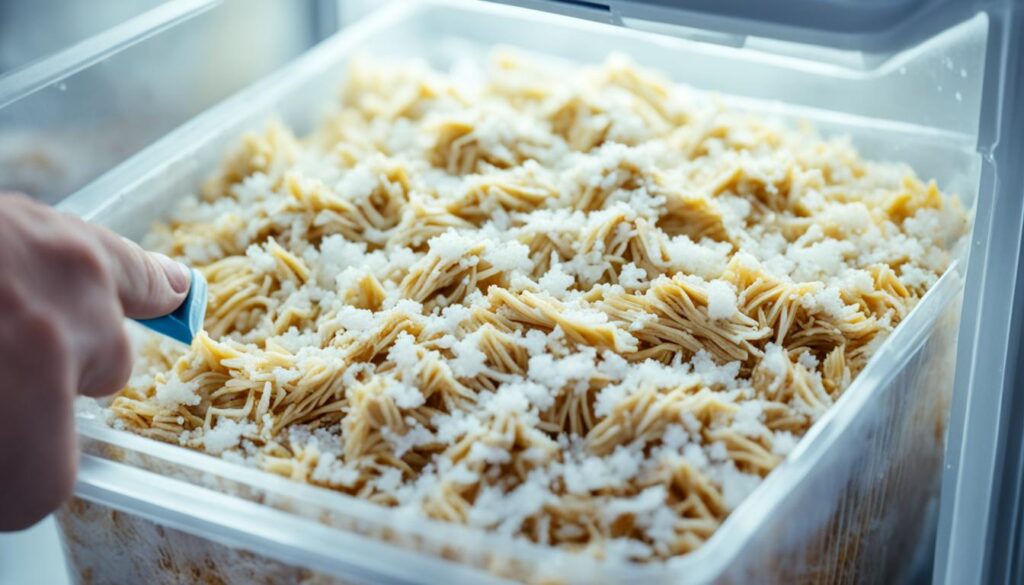Can I Freeze Rotisserie Chicken? Quick Tips

Welcome to our guide on freezing rotisserie chicken! If you have ever found yourself wondering, “Can I freeze rotisserie chicken?” – you’re in the right place. Whether you are looking to extend the shelf life of your favorite rotisserie chicken or have leftovers you want to preserve, we have got you covered.
Rotisserie chicken is flavorful and convenient, making it a popular choice for many households. However, it is not always easy to consume it all before it starts to lose its freshness. That’s where freezing comes in. By properly freezing rotisserie chicken, you can maintain its taste and texture for future use.
In this section, we will explore the topic of freezing rotisserie chicken and provide you with insightful tips on how to properly preserve its freshness and taste. Whether you want to freeze a whole rotisserie chicken or just a portion, we will guide you through the process step by step.
Key Takeaways:
- Freezing rotisserie chicken is a practical way to extend its shelf life and preserve its flavor.
- Proper preparation and packaging are essential when freezing rotisserie chicken to avoid freezer burn.
- Thawing and reheating frozen rotisserie chicken should be done safely following recommended methods.
- Freezing leftovers allows you to enjoy rotisserie chicken in various recipes at a later time.
- By following our tips and techniques, you can confidently freeze and enjoy your favorite rotisserie chicken whenever you want.
Why Freeze Rotisserie Chicken?
If you find yourself with leftover rotisserie chicken, freezing it is a great way to preserve its freshness and extend its shelf life. Freezing rotisserie chicken not only helps prevent food waste, but it also offers several advantages that make it a convenient and cost-effective option.
The Advantages of Freezing Rotisserie Chicken
- Convenience: By freezing rotisserie chicken, you can have a convenient and readily available protein source whenever you need it. Whether it’s for a quick lunch, dinner, or a last-minute meal, having frozen rotisserie chicken on hand saves you time and effort.
- Cost-Effectiveness: Rotisserie chicken from the store can be quite affordable, especially when compared to preparing a whole chicken from scratch. By freezing any leftover rotisserie chicken, you can stretch your food budget and make the most out of your purchase.
- Repurpose Leftovers: Freezing leftover rotisserie chicken opens up a world of possibilities for repurposing it in various recipes. From hearty soups and stews to sandwiches and casseroles, frozen rotisserie chicken can be transformed into delicious meals without compromising taste or quality.
To help you better understand the benefits of freezing rotisserie chicken, consider the following quote:
“Freezing rotisserie chicken has been a game-changer for me. It’s incredibly convenient and saves me so much time in the kitchen. I can easily grab a portion from the freezer and use it in a variety of dishes. Plus, it helps reduce food waste, which is always a win!” – Anna, home cook
By taking advantage of the benefits listed above, you can make the most out of your rotisserie chicken and enjoy its deliciousness even days or weeks after the initial purchase. And to give you a visual representation of the advantages of freezing rotisserie chicken, take a look at the table below:
| Advantages | Explanation |
|---|---|
| Convenience | Ready-to-eat protein source |
| Cost-Effectiveness | Affordable alternative to whole chicken |
| Repurpose Leftovers | Create diverse and delicious meals |
As you can see, freezing rotisserie chicken offers numerous benefits that make it an attractive option for preserving and utilizing this flavorful protein source. In the following section, we will delve into the best methods for freezing rotisserie chicken, so you can enjoy its taste and convenience for longer.
Best Way to Freeze Rotisserie Chicken
If you find yourself with leftover rotisserie chicken and want to make the most of it, freezing is a great option. By freezing rotisserie chicken properly, you can preserve its flavor, texture, and tenderness for future use. Here, we will guide you through the best methods for freezing rotisserie chicken to ensure optimal results.
Step 1: Cool the Chicken
Before freezing rotisserie chicken, it’s important to let it cool down completely. This helps maintain its quality and prevents condensation from forming, which can degrade the texture. Allow the chicken to cool at room temperature for about 20 minutes.
Step 2: Separate and Package
Once the chicken is cooled, remove the meat from the bones and separate it into individual portions or desired sizes. This makes it easier to thaw and use the amount you need without having to defrost the entire batch.
Next, package the chicken in airtight freezer-safe containers or resealable plastic bags. Press out any excess air before sealing to prevent freezer burn. Alternatively, you can wrap the chicken tightly in heavy-duty aluminum foil or plastic wrap.
Pro Tip: Some people find it helpful to portion the chicken into meal-sized portions, while others prefer to store it as a whole. Choose the method that suits your needs and preferences.
Step 3: Label and Date
To avoid confusion, it’s essential to label each freezer container or bag with the contents and date of freezing. This way, you can easily identify and use the oldest chicken first, ensuring freshness and minimizing waste. Use a permanent marker or freezer-safe labels.
Step 4: Freeze Properly
Place the packaged rotisserie chicken in the coldest part of your freezer, such as the back or bottom shelf. This ensures a consistent and low temperature, which helps maintain the quality of the chicken. Ideally, the freezer temperature should be set to 0°F (-18°C) or below.
Step 5: Storage Duration
To preserve the best quality of the frozen rotisserie chicken, it is recommended to consume it within 2-3 months. While it may still be safe to eat after this time, the texture and flavor may deteriorate. Be sure to check for any signs of freezer burn or spoilage before consuming.
Thawing and Reheating: When you’re ready to enjoy the frozen rotisserie chicken, it’s important to thaw it properly. Remove the desired portion from the freezer and thaw it in the refrigerator overnight. Once thawed, you can reheat the chicken in the oven, microwave, or stovetop, ensuring it reaches an internal temperature of 165°F (74°C) for food safety.
With these simple steps, you can freeze your rotisserie chicken without compromising its taste and texture. Whether you’re saving it for a later meal or preserving leftovers, freezing rotisserie chicken can be a convenient and delicious way to make the most of this flavorful dish.

Preparing Rotisserie Chicken for Freezing
When it comes to freezing rotisserie chicken, proper preparation is key to maintaining its quality and flavor. Follow these tips and techniques to ensure your frozen rotisserie chicken stays delicious:
- Remove the meat from the bones: Before freezing, it’s best to separate the chicken meat from the bones. This not only allows for easier storage but also prevents the bones from affecting the texture and taste of the chicken.
- Select the right storage containers: Use freezer-safe containers or freezer bags to pack the chicken. Make sure the containers or bags are airtight to prevent freezer burn and protect the chicken against odors from other foods in the freezer.
- Portion the chicken: Divide the chicken into smaller portions before freezing. This way, you can thaw only the amount you need each time, reducing wastage and ensuring freshness.
- Package the chicken properly: When using freezer bags, squeeze out any excess air before sealing them. If using containers, leave some space at the top to accommodate any expansion during freezing.
- Label and date the packages: To keep track of your frozen chicken, label each package with the date of freezing. This will help you identify the oldest chicken and ensure rotation for optimal freshness.
By following these simple tips, you can effectively prepare rotisserie chicken for freezing, allowing you to keep it on hand for future meals without compromising its taste or texture.

Freezing rotisserie chicken is a convenient way to preserve its flavor and make it last longer.
Thawing and Reheating Frozen Rotisserie Chicken
Once you’ve frozen your rotisserie chicken, it’s important to know how to properly thaw and reheat it to preserve its optimal taste and texture. Follow these steps to enjoy delicious rotisserie chicken even after it has been frozen.
Thawing Frozen Rotisserie Chicken
Thawing frozen rotisserie chicken is a crucial step to ensure safe consumption and maintain its flavor. Here’s how to do it:
- Transfer the frozen rotisserie chicken from the freezer to the refrigerator.
- Allow the chicken to thaw in the refrigerator overnight. This slow thawing process helps retain its moisture and ensures even defrosting.
- Once thawed, use the chicken within 24-48 hours for the best quality and taste.
Reheating Thawed Rotisserie Chicken
When it comes to reheating thawed rotisserie chicken, you have a few options depending on your preferences. Here are two common methods to consider:
Please note that the reheating methods mentioned below are intended for thawed rotisserie chicken.
Oven Method:
- Preheat your oven to 350°F (175°C).
- Place the thawed rotisserie chicken in a baking dish or on a baking sheet.
- Cover the chicken with aluminum foil to prevent it from drying out.
- Bake for about 20-30 minutes or until the internal temperature reaches 165°F (74°C), ensuring it is heated throughout.
- Remove from the oven and let it rest for a few minutes before serving.
Microwave Method:
- Place the thawed rotisserie chicken on a microwave-safe plate.
- Cover the chicken with a microwave-safe lid or microwave-safe plastic wrap to retain moisture.
- Set your microwave to medium heat or 50% power.
- Reheat the chicken in intervals of 1-2 minutes, flipping and rearranging the pieces between each interval.
- Check the internal temperature with a meat thermometer, ensuring it reaches 165°F (74°C).
- Allow the chicken to rest for a few minutes before consuming.
By following these thawing and reheating methods, you can enjoy the convenience of frozen rotisserie chicken without compromising on taste or quality.
| Thawing Method | Reheating Method | Total Time |
|---|---|---|
| Refrigerator (overnight) | Oven (baking) | Approximately 30-40 minutes |
| Refrigerator (overnight) | Microwave | Approximately 10-15 minutes |
Freezing Leftover Rotisserie Chicken
When it comes to enjoying the convenience and delicious taste of rotisserie chicken, it’s common to have leftover portions. Freezing these leftovers is a great way to extend their shelf life and prevent food waste. Plus, it provides you with a handy ingredient for future meals. In this section, we will explore the benefits of freezing leftover rotisserie chicken and provide you with tips on how to properly store and utilize it in various recipes.
The Benefits of Freezing Leftover Rotisserie Chicken
Freezing leftover rotisserie chicken offers several advantages:
- Prolongs freshness: By freezing the chicken, you can preserve its taste and texture, allowing you to enjoy it at a later time without compromising its quality.
- Cost-effective: Instead of letting the leftovers go to waste, freezing them allows you to save money by utilizing them in future meals, reducing the need to buy additional ingredients.
- Enhances meal planning: Having frozen rotisserie chicken on hand provides you with a versatile ingredient that can be easily incorporated into a variety of recipes, making meal planning and preparation more convenient.
Properly Storing and Utilizing Frozen Leftover Rotisserie Chicken
To ensure the best results when freezing leftover rotisserie chicken, follow these tips:
- Allow the chicken to cool: Before freezing, make sure the leftovers have completely cooled down. This helps maintain their quality and prevents the growth of harmful bacteria.
- Use freezer-safe containers or bags: Transfer the chicken to airtight and freezer-safe containers or bags. This helps protect the chicken from freezer burn and maintains its freshness.
- Label and date: Always label the containers or bags with the date of freezing. This allows you to keep track of how long the chicken has been frozen and ensures you use it within a safe timeframe.
- Divide into smaller portions: Consider dividing the chicken into smaller portions before freezing. This makes it easier to thaw and use only the amount you need for a particular recipe.
- Utilize in various recipes: Frozen rotisserie chicken is incredibly versatile. Use it in salads, sandwiches, casseroles, soups, and other dishes to add flavorful protein and save time on meal preparation.
By following these guidelines, you can confidently freeze leftover rotisserie chicken and enjoy its deliciousness in a variety of meals. Whether you’re looking to whip up a quick dinner, pack a protein-packed lunch, or create a flavorful appetizer, frozen rotisserie chicken has got you covered.
| Recipe Ideas: | Description: |
|---|---|
| Chicken Caesar Salad | A classic salad with rotisserie chicken, crisp lettuce, parmesan cheese, and homemade Caesar dressing. |
| Chicken Quesadillas | Deliciously cheesy quesadillas filled with seasoned rotisserie chicken and served with salsa and guacamole. |
| Chicken Noodle Soup | A comforting bowl of soup made with rotisserie chicken, vegetables, and egg noodles. |
| Chicken Pot Pie | A hearty and flavorful pot pie filled with rotisserie chicken, vegetables, and a creamy sauce, topped with a flaky crust. |
Extending Freshness of Frozen Rotisserie Chicken
Properly preserving the freshness of frozen rotisserie chicken is essential to maintain its flavor and quality. By following these tips, you can ensure that your frozen rotisserie chicken stays delicious for an extended period:
- Storage Temperature: Store your frozen rotisserie chicken at a consistent temperature of 0°F (-18°C) or below. This low temperature helps prevent bacterial growth and maintains the chicken’s texture and taste. Consider using a refrigerator or freezer thermometer to monitor the temperature accurately.
- Proper Packaging: To prevent freezer burn and maintain the juicy texture of your frozen rotisserie chicken, it’s crucial to package it correctly. Wrap individual portions tightly in plastic wrap or aluminum foil, ensuring there are no air pockets. Then, place the wrapped portions in airtight freezer bags or containers to provide an extra layer of protection.
- Labeling: Don’t forget to label your frozen rotisserie chicken with the date of freezing. This way, you can keep track of its freshness and ensure that you consume it within the recommended timeframe.
- Storage Duration: While frozen rotisserie chicken can last for several months, it’s best to consume it within 2-3 months for optimal taste and quality. Beyond this timeframe, the chicken may start to lose its flavor and become excessively dry.
By implementing these strategies, you can enjoy the preserved goodness of rotisserie chicken for an extended period. Remember to follow safe food handling practices and thaw and reheat the chicken properly before consuming.
Now that you know how to preserve the freshness of frozen rotisserie chicken, let’s move on to the next section where we will explore the correct methods for thawing and reheating your frozen chicken.
Conclusion
In conclusion, freezing rotisserie chicken is a practical and convenient way to preserve its delicious taste and texture. By following the tips and techniques provided in this article, you can confidently freeze your favorite rotisserie chicken and enjoy it whenever you want.
Freezing rotisserie chicken offers several benefits, including cost-effectiveness and the ability to repurpose leftovers. It allows you to save time and money by preparing larger quantities of chicken in advance, and it’s a great way to ensure you always have a delicious meal option on hand.
Remember to properly prepare the rotisserie chicken before freezing, using appropriate storage containers and packaging techniques. Labeling the containers with the date of freezing will help you keep track of the freshness. Additionally, make sure to follow proper thawing and reheating methods to maintain the texture and flavor of the chicken.
By extending the freshness of frozen rotisserie chicken through proper storage temperatures and durations, you can maximize its shelf life and minimize any potential food waste. So go ahead, freeze your rotisserie chicken with confidence, and enjoy the convenience and taste it brings to your meals.
FAQ
Can I freeze rotisserie chicken?
Yes, you can freeze rotisserie chicken. Freezing is a great way to preserve its freshness and taste for later use.
Why freeze rotisserie chicken?
Freezing rotisserie chicken offers several advantages. It allows for convenient meal planning and saves you time and effort in cooking. It also helps in reducing food waste and can be a cost-effective option.
What is the best way to freeze rotisserie chicken?
The best way to freeze rotisserie chicken is to first remove the meat from the bones. Then, place the chicken in airtight freezer bags or containers. Be sure to label and date them for easier organization.
How do I prepare rotisserie chicken for freezing?
To prepare rotisserie chicken for freezing, ensure it has cooled down completely. Remove the chicken meat from the bones and store it in freezer-safe bags or containers. It is also essential to remove any excess fat or skin, as they can affect the quality of the frozen chicken.
How do I thaw and reheat frozen rotisserie chicken?
When thawing frozen rotisserie chicken, it is best to do so in the refrigerator overnight. It is important to note that refreezing thawed chicken is not recommended for food safety reasons. To reheat, place the thawed chicken in the oven or microwave until it reaches the desired temperature.
Can I freeze leftover rotisserie chicken?
Absolutely! Freezing leftover rotisserie chicken is a great way to prevent it from going to waste. Just ensure it has cooled down completely before transferring it to freezer bags or containers.
How can I extend the freshness of frozen rotisserie chicken?
To extend the freshness of frozen rotisserie chicken, it is important to store it at a consistent temperature of 0°F (-18°C) or below. It is also recommended to use the frozen chicken within 3-4 months for best quality.







